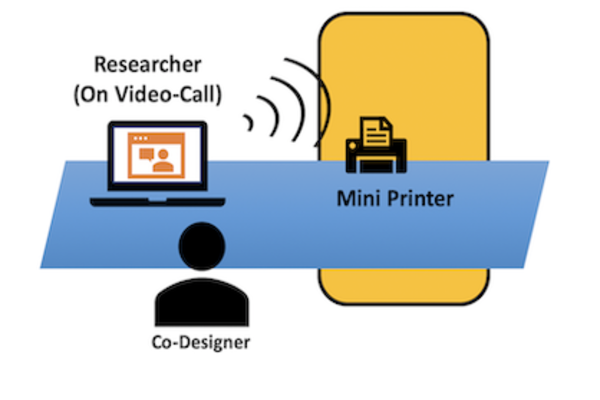Advancing Design Methods for Older Adults and People with Dementia
Developing new ways to co-design technology
This research project is funded by Inclusive Information and Communications Technology RERC (90REGE0008) from the National Institute on Disability, Independent Living, and Rehabilitation Research (NIDILRR), Administration for Community Living (ACL), Department of Health and Human Services (HHS). Learn more about the work of the Inclusive ICT RERC.
Project Team: Amanda Lazar (Lead); Teja Maddali, Alisha Pradhan, Emma Dixon, Amelia Short, Ruipu Hu (Students); Mary Radnofsky, Diana Blackwelder (Advocates)

This project is exploring remote methods for researchers and people with dementia to co-design technology.
Potential impact of this project on the lives of people with disabilities
User-centered design is an important approach that incorporates the perspectives of the people who use technology. As different academic disciplines, industry, and government organizations increasingly utilize user-centered design methods like co-design, we must ensure that our methods are accessible and meaningful for different populations.
We are studying current approaches to designing with older adults and working on creating design materials that are meaningful to individual contexts and avoid introducing stigma around age.
We are also working on addressing the need for new ways of designing technology that includes people with dementia at all stages of the process. We are developing new ways to design with people with dementia through a range of projects, including intergenerational hackathons, remote research methods, and participatory action research. Together, these projects focus on ways to support user-centered designers (in industry and academia) in working with older adults as well as people with dementia.
This project will help make the following outcomes possible:
- Design projects being more accessible and meaningful for older adults including people with dementia.
Definitions
- Dementia is a syndrome that involves changes in cognition (thinking, remembering, and reasoning) and abilities, often affecting the ways that individuals engage in daily activities. Dementia is often caused by conditions such as Alzheimer’s Disease or Vascular dementia. Dementia is a stigmatized condition and can affect memory, language skills, visual perception, problem solving, self-management, and the ability to focus, among other cognitive, sensory and motor capacities. Dementia does not affect the ability to feel emotions, enjoy pleasant experiences, and engage meaningfully in life.
- Participatory action research involves all the stakeholders in the research process, from the identification of research questions, planning of the research design, doing the research, and analyzing and then presenting the results. This approach centers the people most affected by the research.
- Hackathons are events where users, programmers, graphic designers, and others work together on a design project, often a software or technology development project.
PUBLICATIONS
- Wood, R., Dixon, E., Elsayed-Ali, S., Shokeen, E., Lazar, A., & Lazar, J. (2021). Investigating best practices for remote summative usability testing with people with mild to moderate dementia. ACM Transactions on Accessible Computing, 14 (pp. 1-26, No. 11). New York: ACM. DOI: https://dl.acm.org/doi/10.1145/3460942 PMCID: PMC8855365
- Read the full paper.
- Summary (coming soon)
- View presentation from ASSETS 2021.
- Chopra, S., Dixon, E., Ganesh, K., Pradhan, A., Radnofsky, M. L., & Lazar, A. (2021). Designing for and with people with dementia using a human rights-based approach. In Y. Kitamura, A. Quigley, K. Isbister, & T. Igarashi (Eds.), CHI EA ’21: Extended Abstracts of the 2021 CHI Conference on Human Factors in Computing Systems (pp. 1-8, No. 44). New York: ACM. DOI: https://doi.org/10.1145/3411763.3443434 PMCID: PMC8375512
- Maddali, H. T., Dixon, E., Pradhan, A., & Lazar, A. (2020). Supporting remote participation when designing with people with dementia. CSCW ’20 Companion: Conf. Comp. Pub. of 2020 Computer Supported Cooperative Work & Social Computing (pp. 335-340). New York: ACM. DOI: https://doi.org/10.1145/3406865.3418316 PMCID: PMC8798922
- Dixon, E., & Lazar, A. (2020). Approach matters: Linking practitioner approaches to technology design for people with dementia. CHI ‘ 20: Proceedings of the 2020 CHI Conference on Human Factors in Computing Systems (pp. 1-15, No. 305). Honolulu, Hawaii: Association for Computing Machinery. DOI: https://doi.org/10.1145/3313831.3376432 PMCID: PMC7383934
- Hodge, J., Foley, S., Brankaert, R., Kenning, G., Lazar, A., Boger, J. N., & Morrissey, K. (2020). Relational, flexible, everyday: Learning from ethics in dementia research. CHI ‘ 20: Proceedings of the 2020 CHI Conference on Human Factors in Computing Systems (pp. 1-16, No. 500). Honolulu, Hawaii: Association for Computing Machinery. DOI: https://doi.org/10.1145/3313831.3376627 PMCID: PMC7377302
PRESENTATIONS
Investigating Best Practices for Remote Summative Usability Testing with People with Mild to Moderate Dementia [ACM TACCESS paper presented at ASSETS ’21]
Designing for and with People with Dementia Using a Human Rights-Based Approach [CHI ’21]
Supporting Remote Participation When Designing with People with Dementia [CSCW ’20] Approach Matters: Linking Practitioner Approaches to Technology Design for People with Dementia [CHI ’20] Watch this presentation on YouTube.Relational, Flexible, Everyday: Learning from Ethics in Dementia Research [CHI ’20]




